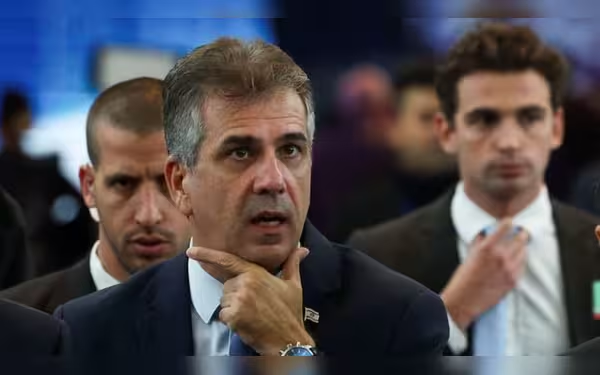Saturday, November 16, 2024 09:46 PM
Israel Anticipates Tough US Stance on Iran Under Trump
- Israel expects Trump to adopt a hard line on Iran.
- Energy Minister Cohen highlights regional security opportunities.
- Ongoing conflict with Hamas complicates Middle Eastern dynamics.
 Image Credits: channelnewsasia
Image Credits: channelnewsasiaIsrael anticipates a tough US stance on Iran under Trump, aiming for regional security and peace agreements amid ongoing conflicts.
In recent developments, Israel is anticipating a significant shift in its foreign policy landscape with the incoming administration of US President Donald Trump. The Israeli government, particularly its security cabinet, is expressing optimism that Trump will adopt a stringent approach towards Iran and its nuclear ambitions. This expectation is rooted in the belief that a tougher stance on Iran could pave the way for enhanced peace agreements with neighboring Arab countries.
Energy Minister Eli Cohen, a prominent figure in Israel's security discussions, has articulated this sentiment clearly. He emphasized that the current geopolitical climate presents a unique opportunity for Israel to strengthen its position in the region. Cohen noted that Israel is closer than ever to finalizing an agreement aimed at ceasing hostilities in Lebanon, particularly in efforts to push back the Iran-backed group Hezbollah from its borders. He underscored Israel's commitment to maintaining its military readiness, asserting that the nation reserves the right to respond forcefully if its security is threatened.
The backdrop to these discussions is the ongoing conflict that escalated on October 7, 2023, when Hamas, another group supported by Iran, launched an attack from Gaza into southern Israel. This prompted a swift and severe military response from Israel, which has included extensive air and ground operations in Gaza and increased military activity in southern Lebanon. The situation has been further complicated by Iranian-backed militias launching attacks on Israel from locations such as Yemen and Iraq, leading to direct confrontations between Israel and Iran.
Cohen pointed out that Trump’s previous administration was marked by a period of relative stability in the region, largely due to the sanctions imposed on Iran. He expressed hope that the new administration would continue this policy, emphasizing the importance of taking decisive action against Iran as a central focus of US-Israel relations.
As the world watches these developments unfold, it is clear that the dynamics of Middle Eastern politics are at a critical juncture. The potential for new peace deals with Arab nations, coupled with a firm stance against Iran, could reshape the region's future. However, the path forward is fraught with challenges, and the international community will be keenly observing how these relationships evolve under the Trump administration. The implications of these policies will not only affect Israel and Iran but could also have far-reaching consequences for global peace and security.













